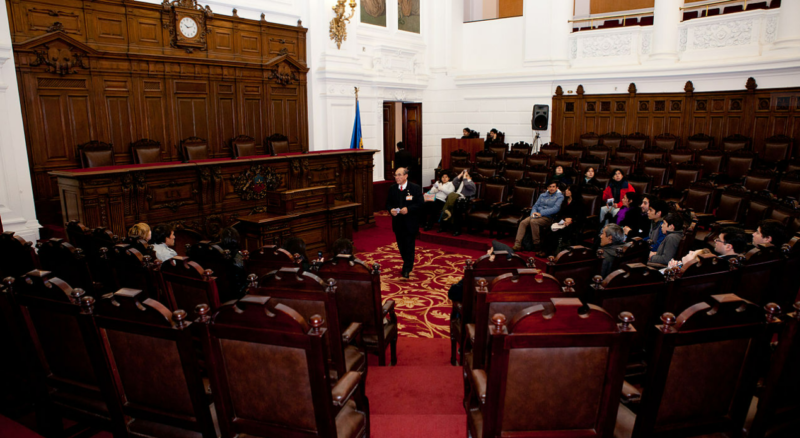The Nationalism of Cristina Fernández de Kirchner
Argentine President Cristina Fernández has increased her appeals to nationalist sentiment to build domestic political support.
A Daily Publication of The Dialogue
The committee in charge of drafting a new constitution for Chile on Feb. 1 approved a proposal that could pave the way to the nationalization of some of the country’s largest copper and lithium mines. The proposal would still need the support of two-thirds of the full constitutional convention in order to become part of the draft constitution that will be put before voters later this year. How likely is it that a nationalization of Chilean copper and lithium mines will become part of the referendum and ultimately part of the constitution? What would such nationalizations mean for Chile and its economy? What is the status and likelihood of passage of other proposals of the constitutional convention, such as the proposal to convert the country’s Congress into a unicameral body?
Sergio Bitar, nonresident senior fellow at the Inter-American Dialogue and former Chilean minister of mining, education and public works: “Neither the proposal for the nationalization of natural resources nor that of a radical change in political institutions will be part of the draft of the new Chilean Constitution. One cause for the uproar is the working method of the constitutional convention. It allows for the announcement of radical proposals, which are amplified in the media, even though they have no chance of reaching the required two-thirds majority. The plenary vote has now begun, and doubts will be cleared up. Will big agreements be possible? Will there be a sufficient number of convention members—103 out of 154—capable of converging instead of fragmenting and complying with what the people have ordered? That is the great dilemma of Chile today. As for the proposal to nationalize mining, it has no political or economic viability. A nationalization would imply enormous amounts to pay that nobody has calculated. Chile exported close to $50 billion worth of copper in 2021 and, with the future price prospects for global electrification in the face of climate change, the values of copper companies are enormous. The best policy is to increase tax revenues from mining (royalties) and create new value and diversify to new products in order to allocate those incomes to social and technological priorities. The path is to advance in green copper, increase productivity to compensate for lower ore grades, develop solar energy, renovate smelters, produce green hydrogen, process lithium and desalinate seawater in the face of the great water crisis. The path is not a nationalization policy of the 20th century, but rather a strategy for the 21st century of scientific, ecological, digital and educational progress and greater surpluses for Chile.”
Thea Riofrancos, associate professor of political science at Providence College: “Chile’s debate over mining is unfolding at the intersection of four processes: the election of Gabriel Boric, a leader in the 2011-13 student protests; the constitutional convention rewriting the dictatorship-era constitution; growing global demand for two of the country’s exports, copper and lithium, both with vital roles in the energy transition; and an intensifying climate crisis. In this context, convention delegates—a majority of whom are on the left of the spectrum, and many with ties to feminist, Indigenous and environmental movements—are considering reforms to transform resource governance. One approach is to expand the state’s role in mining sectors. It’s worth noting that nationalization has a long history in Chile and has crossed partisan divides: while it was democratic socialist Salvador Allende (1970-1973) who completed the process of copper nationalization in 1971, right-wing dictator Augusto Pinochet established Codelco, the state-owned copper company—and the world’s largest—in 1976. Meanwhile, the idea of a state-owned lithium company was proposed under the center-left Michele Bachelet government, is a plank in Boric’s platform and is supported by leftist parties and unions. A state-owned company could ensure that Chileans benefit from the global ‘lithium boom’—but it would also need to confront the legacy of environmental and social harm in the country’s ‘sacrifice zones.’ Convention delegates are considering adopting a ‘rights of nature’ framework, modeled on Ecuador’s 2008 Constitution, to rebalance the relationship between economic activity and the environment, as well as recognizing Indigenous peoples’ rights to prior consultation, which could give communities a voice in resource governance.”
Kathleen C. Barclay, former president of the American Chamber of Commerce in Chile: “Many initial proposals have been approved, including nationalizing mining, exiting trade agreements and invalidating certain project approvals, as well as proposals on water rights. The economic and social consequences of these measures are such that they are unlikely to be approved by the required two-thirds majority in the full convention. Also of concern is the discussion regarding the political system and the independence of economic institutions including the central bank. A unicameral legislature combined with strong regional decentralization could open the door for further political fragmentation and the rise over time of authoritarian leadership. While there is general acceptance of the importance of independent economic institutions, there is a strong movement to increase political control over them. Lack of clarity in the second instance will increase uncertainty levels. There is a long way to go before there is a clear picture of the shape of the new constitution: approval of measures by the full constitutional convention, the harmonization process, the referendum and implementing legislation, which will follow. Expect an extended period of uncertainty. The key will be for the convention and the government in the process of developing implementing legislation to find the right balance between more responsiveness to social/environmental needs and required certainty to stimulate investment and create jobs for the Chilean people. If this balance is successfully achieved, Chile has the opportunity to become stronger with a social and economic system sustainable for the future. Unfortunately, at this point the balance does not appear to fully consider the economic and social risks for the Chilean people.”
Mariano Machado, senior Americas analyst at Verisk Maplecroft: “Less than 150 days from the deadline, Chile’s constitutional convention remains mired by horizontal power relations and faction-driven priorities. Procedural and technical problems, especially for the most contentious proposals, mean finishing the task on time is nigh on impossible. Chief among them is the proposed nationalization of copper, lithium and other strategic assets. Although the motion was approved at the commission level, the vote was neck-and-neck (11-8). This outcome suggests the proposal is far from securing the two-thirds majority required to pass the plenary; a rejection would send it back to the commission. If the plenary strikes it down twice, the proposal is dismissed altogether, which raises concerns about matters on which there is consensus but may fall through the cracks of this process—with an equally disruptive outcome. Disagreement on the substance is indeed a major hurdle. Much like other initiatives nearing expropriation, we expect the industry to respond with immediate demands for compensation, including potential exposure of the incoming government to numerous, drawn-out international legal cases. For example, estimates about compensation should water rights return to the state (another ongoing discussion) put the bill at $20 billion. The back-and-forth will continue until the end of June when voters need to see a text they will eventually vote on in a referendum. This is the milestone for businesses to assess the potential impacts lying ahead. The key risk is that radical proposals can be as disruptive as wishy-washy wording, a byproduct of political fragmentation.”
Nelson Altamirano, professor of economics in the Department of Finance, Economics and Accounting at National University: “There will be a reform for the mining sector because there is an agreement in Chilean society that large multinational copper companies are not paying their fair share. There is a generalized agreement that, for instance, the current royalty of 40 percent on profits is too low and more copper refinement inside the country is needed. However, these changes will come the Chilean way. In the Chilean way, Allende’s nationalization of the copper industry in the 1970s was a continuation of a process that started 50 years before, not a communist madness. Pinochet reversed all nationalizations except in mining, and Codelco became an efficient and profitable state-owned enterprise contrary to the cases in other developing countries. Codelco became the largest copper firm in the world by the 1990s. Re-privatization did not touch Coldelco, and Chilean copper output multiplied by four or five times in the last 20 years. The institutions around the mining industry, private and governmental, are so solid in Chile that regulatory changes do not kill the goose that lays golden eggs. The proposal to nationalize all private copper mining has zero chance of being approved by two-thirds of the constitutional convention. A constitutional reform to increase refinement operations by large private copper mines, the reaffirmation that the state owns lithium resources and the creation of a national lithium firm have high changes of being approved.”
 The Latin America Advisor features Q&A from leaders in politics, economics, and finance every business day. It is available to members of the Dialogue’s Corporate Program and others by subscription.
The Latin America Advisor features Q&A from leaders in politics, economics, and finance every business day. It is available to members of the Dialogue’s Corporate Program and others by subscription.
Argentine President Cristina Fernández has increased her appeals to nationalist sentiment to build domestic political support.
Bolivia’s success as one of the fastest growing economies in the past decade stems from its unique economic model.
Chile has been rocked with corruption scandals and political unease. Two of Latin America’s leading thinkers discuss why.
 The committee that is to draft a new Chilean Constitution is considering mine nationalizations. Formal sessions of the constitutional convention began Tuesday in the Chamber of Deputies of the former National Congress building. // File Photo: Chilean Government.
The committee that is to draft a new Chilean Constitution is considering mine nationalizations. Formal sessions of the constitutional convention began Tuesday in the Chamber of Deputies of the former National Congress building. // File Photo: Chilean Government.
 Video
Video